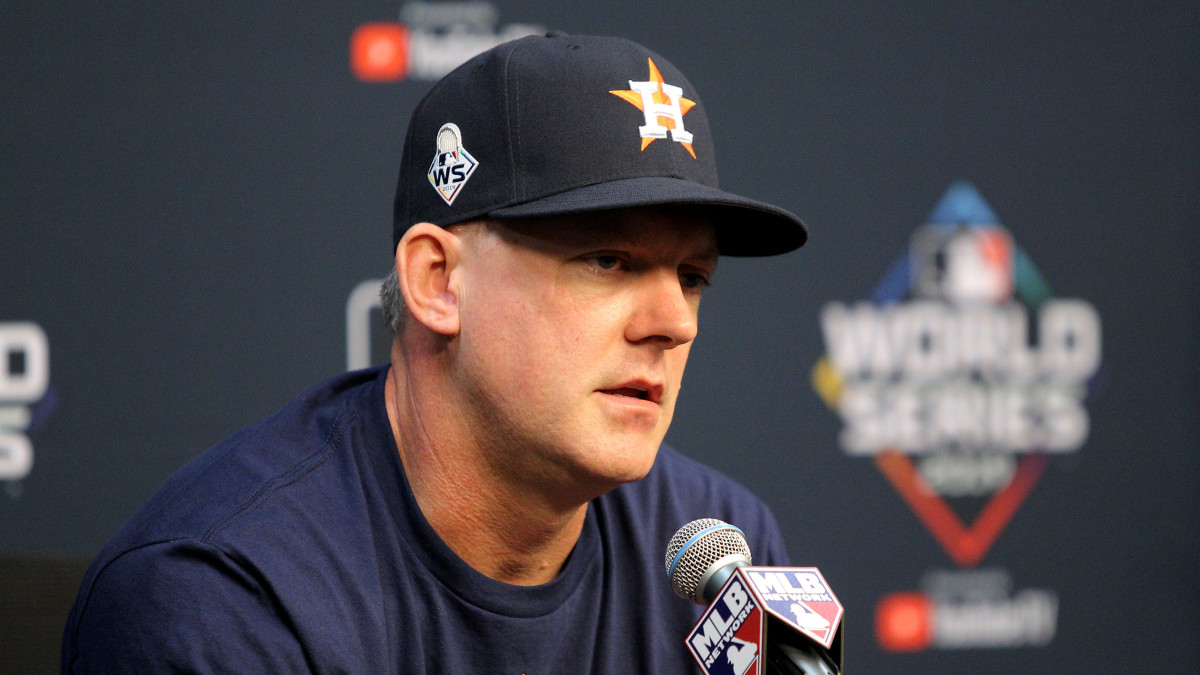Why the Astros Must Admit They Cheated


We know two important facts about the Houston Astros. One is that over the past three years, they have had the best team in baseball. The other, thanks to a huge story in The Athletic, is that they used an illegal video system to steal signs in 2017, the year they won the World Series.
Now they have to choose between these two perceptions:
1. The Astros have the best team in baseball and they cheated.
2. The Astros have the best team in baseball because they cheated.
Understand: “The Astros didn’t cheat” is not an option. People know. They read former Astros pitcher Mike Fiers detail the system on the record. The Astros were not the only ones to break the rules, but they pretty obviously did break them.
There is no doubt what the Astros did is wrong. How much did it help? We can debate that forever. But the only reason to do it is because it helps.
Wait... what....? https://t.co/z4i9MHTAVr
— Aaron Judge (@TheJudge44) November 12, 2019
This looks and feels like Spygate, the infamous Patriots’ cheating scandal from 2007. And the Astros and Major League Baseball should study Spygate. There are lessons there. The NFL and the Pats handled that so poorly that the repercussions still linger.
Let’s go over the similarities between the scandals first. In football and in baseball, stealing the opponents’ signals is legal, but using video to do it is not.
Coaches watching other coaches through binoculars: totally fine. Runner on second base watching the catcher’s fingers: also fine.
Videotaping football coaches’ defensive signals so you can match them up with the plays later: definitely not OK. Using a centerfield camera to pick up signals so somebody in a tunnel behind the dugout can alert the batter: also not OK.
The Astros are a lot like the Patriots: They win a ton, they have unconventional methods, they are secret about those methods, and there is a lingering suspicion that they like to dress up as valet-parking attendants and steal cars. And so, much as rival NFL teams loved the Spygate scandal, there are surely a lot of baseball executives cackling and rubbing their hands together right now.
But there are also a few key differences here. One is that the sports are quite different. Football teams are always terrified about somebody watching their practices. Baseball players do a lot of their practicing in full view of the public. To this day, many members of the 2001 St. Louis Rams believe, but cannot prove, that the Patriots filmed their walkthrough before the Super Bowl. It’s hard to even find a comparable possible allegation in baseball, unless somebody says the Astros videotaped the meetings when they go over opposing hitters or something.
The other big difference: The Patriots were widely seen as the lone team breaking this rule, and they were warned about it. A year before Spygate broke, NFL senior vice president for football operations issued a memo reminding teams that "videotaping of any type, including but not limited to taping of an opponent's offensive or defensive signals, is prohibited.” The Pats kept doing it, and they were perceived as outliers.
The Astros may be perceived as the worst offenders. They might even be the worst offenders. But they are definitely not the only offenders. The 2017 Red Sox were fined for using Apple watches to steal signs. The technology was different, but this was the same offense the Astros committed.
If the Astros are only proven to have done it in 2017, then that means they stopped before the league started issuing firm warnings about it. But that is an enormous if.
And this brings us to the big lesson here for the Astros and MLB: Come clean. The NFL and the Patriots never really did. NFL commissioner Roger Goodell destroyed video evidence, which was ridiculous and a huge mistake. It only aroused suspicions that the Patriots’ sins were even worse than they probably were. Patriots coach Bill Belichick has admitted his team was “wrong” but has not really come close to a full mea culpa. He has said, for example, that the Patriots did what “a lot of other teams” did. Nobody wants to hear that.
Those reactions are a big reason why Spygate has never fully gone away. Opposing teams still do not trust the Patriots. They still wonder what happened. They still wonder what Goodell knew. And every single time the Patriots commit an infraction—most notably with Deflategate—people want blood. Goodell overreacted to Deflategate because his constituents wanted him to overreact. And the Patriots and their fans saw the overreaction and believed the league had it in for them. It has created a never-ending cycle of mistrust.
This Astros scandal doesn’t have to be this way. There should be an open, honest investigation. No excuses. Full apologies. Genuine humility. The Astros should let the rest of us point out that they were not alone. They should take it upon themselves to improve their relationships with the other 29 teams. And then the Astros can do what the Patriots have done: Keep winning, because they have the best organization in the sport.
